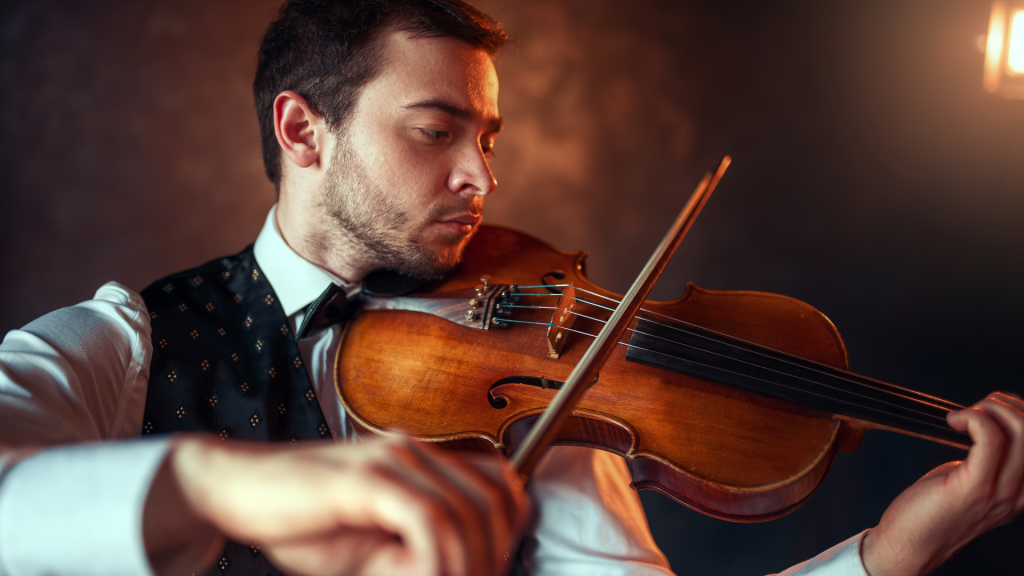Classical music, with its rich history and profound depth, can be a daunting realm to explore for beginners. Often perceived as an exclusive genre reserved for the connoisseur, it, in reality, offers a universe of emotional and intellectual richness accessible to all. The goal of this blog post is to demystify classical music and provide a welcoming starting point for those new to this genre. Classical music is not just a genre but a journey through time, capturing the essence of human emotions and intellect over centuries.
Understanding classical music begins with appreciating its significance and timelessness. It’s a genre that has withstood the test of time, evolving through various periods, each marked by distinct styles and legendary composers. It ranges from the intricate compositions of the Baroque period to the expressive works of the Romantic era, offering a diverse tapestry of sounds and structures.
This post aims to guide beginners through the initial steps of exploring classical music. From highlighting key composers and their masterpieces to offering tips on how to approach listening, this guide is designed to make the classical music journey enriching and enjoyable. Whether you’re looking to deepen your appreciation for music or seeking a new cultural experience, this introduction to classical music will provide the roadmap for a fulfilling exploration.
Understanding Classical Music
Delving into the world of classical music begins with a brief understanding of its rich history and defining characteristics. Classical music, which originated in Western culture, has a lineage that dates back to the Middle Ages, evolving through various historical periods including the Renaissance, Baroque, Classical, Romantic, and 20th Century eras. Each of these periods brought distinct stylistic changes, reflecting the social and cultural shifts of the times. For instance, the Baroque era, known for its ornate and intricate music, contrasts sharply with the clarity and balance of the Classical period that followed.
The key characteristics of classical music often include a complex structure and a high degree of compositional technique. This music is typically written in formal scores using a system of notation that has been developed over centuries. Elements like melody, harmony, rhythm, and dynamics are intricately woven together to create compositions that can convey a wide range of emotions, from joy and exuberance to deep sorrow and contemplation.
Each period in classical music is marked by its influential composers, whose works have stood the test of time. For instance, Johann Sebastian Bach and George Frideric Handel are titans of the Baroque era, known for their masterful use of counterpoint and melody. The Classical period boasts names like Wolfgang Amadeus Mozart and Ludwig van Beethoven, whose compositions are celebrated for their form and expressive depth. The Romantic era introduced composers like Johannes Brahms and Pyotr Ilyich Tchaikovsky, whose music is often characterized by its emotional intensity and rich textures.
The impact of these composers on the evolution of classical music is monumental. Their works not only defined the aesthetic of their respective eras but also pushed the boundaries of music, introducing new concepts and techniques. Understanding the contributions of these key figures provides a foundational appreciation of classical music and its development through the ages. This historical and stylistic context is crucial for beginners, as it offers a lens through which to understand and appreciate the diverse and rich repertoire of classical music.
Iconic Composers to Know
When embarking on a journey through classical music, familiarizing oneself with iconic composers is essential. These composers, with their groundbreaking works, have shaped the course of music history and offer a splendid starting point for beginners.
Johann Sebastian Bach, a towering figure of the Baroque era, is renowned for his complex compositions and masterful use of counterpoint. His works, such as the “Brandenburg Concertos” and the “Mass in B minor,” exhibit a profound depth and technical precision that continue to influence musicians today. Similarly, George Frideric Handel, known for his grandiose operas and oratorios like “Messiah,” remains a pivotal figure of the same era.
The Classical period is marked by the genius of Wolfgang Amadeus Mozart and Ludwig van Beethoven. Mozart’s vast repertoire, including operas like “The Magic Flute,” symphonies, and chamber works, is celebrated for its melodic beauty and formal perfection. Beethoven, straddling the Classical and Romantic eras, revolutionized music with his emotional depth and innovative compositions, epitomized in works like his “Symphony No. 9.”
The Romantic era introduced composers like Johannes Brahms and Pyotr Ilyich Tchaikovsky. Brahms is admired for his richly textured music and symphonic works, which combine the classical tradition with romantic expressiveness. Tchaikovsky, known for ballets like “Swan Lake” and “The Nutcracker,” brought a distinctive Russian flavor to his compositions, filled with lush melodies and dramatic narratives.
Understanding these composers and their notable works provides a gateway into the world of classical music. Their compositions not only reflect the artistic trends and cultural contexts of their times but also offer timeless beauty and emotional depth that continue to resonate with listeners today. For beginners, these composers serve as the cornerstone of classical music appreciation, their works a guiding light through the genre’s rich and varied landscape.
Exploring Notable Classical Pieces
Exploring notable classical pieces is a journey through some of the most beautiful and influential music ever composed. For beginners, starting with these masterpieces can provide an enlightening introduction to the classical genre.
In the realm of orchestral works, Beethoven’s “Symphony No. 5” stands out as an iconic piece known for its compelling four-note opening motif. This symphony, a masterpiece of the Classical and early Romantic era, showcases a dramatic struggle and triumphant resolution, embodying Beethoven’s innovative spirit. Another essential work is Tchaikovsky’s “1812 Overture,” a piece combining grandeur and lush orchestration, famous for its incorporation of cannon fire and ringing chimes.
Opera and ballet also offer a rich vein of classical music. Mozart’s “The Marriage of Figaro” and Puccini’s “La Bohème” are excellent starting points for exploring opera, each work weaving intricate human emotions into captivating musical narratives. In ballet, Tchaikovsky’s “Swan Lake” and Stravinsky’s “The Rite of Spring” stand as monumental works, the former for its romantic melodies and the latter for its avant-garde approach that reshaped modern ballet.
Chamber music and solo pieces also hold significant places in the classical repertoire. Johannes Brahms’ “Hungarian Dances” are lively and melodious pieces that capture the spirit of Hungarian folk music. For solo piano, Chopin’s “Nocturnes” offer a window into the soulful and poetic nature of Romantic music, while Bach’s “The Well-Tempered Clavier” provides an encyclopedic overview of Baroque keyboard music.
These pieces, revered for their artistic excellence and emotional depth, have stood the test of time. They serve as essential listening for anyone new to classical music, offering a diverse range of styles and emotional experiences. By exploring these masterpieces, beginners can start to appreciate the vastness and beauty of the classical music world.
Getting Started with Listening
Getting started with listening to classical music can be both exciting and overwhelming given the genre’s vastness. For beginners, it’s important to approach listening with an open mind and a willingness to explore. Here are some tips to enhance your listening experience.
Firstly, start with the classics. As highlighted in the previous section, iconic pieces by renowned composers like Beethoven, Mozart, and Tchaikovsky are great entry points. These works are not only foundational to understanding classical music, but they also provide a diverse range of styles and emotions. Listen to different periods – from the structured elegance of the Classical era to the expressive passion of the Romantic era – to find what resonates with you.
Secondly, create a conducive listening environment. Classical music often contains subtle nuances and complexities that are best appreciated in a quiet setting without distractions. Use good quality headphones or speakers to fully appreciate the range of sounds. Set aside dedicated time to listen, allowing yourself to be fully immersed in the music.
Also, consider guided listening. Many online platforms and music apps offer playlists curated for beginners, along with commentary and insights about the pieces. This can provide valuable context and enhance your understanding of the music. Exploring different recordings of the same piece can also be enlightening, as it reveals how interpretation can vary significantly between orchestras and conductors.
Incorporate classical music into your daily life. Whether it’s background music for studying or a soundtrack for your morning routine, integrating classical music into different parts of your day can make it a more familiar and enjoyable part of your life.
Lastly, be patient and curious. Developing an appreciation for classical music can take time. Your tastes and preferences will evolve as you explore more. Don’t hesitate to revisit pieces that didn’t initially resonate with you, as your perception may change with increased exposure and understanding.
By following these tips, beginners can embark on an enriching journey into the world of classical music, discovering its timeless beauty and the profound emotional experiences it offers.
Attending Live Performances
Attending live performances is a pivotal aspect of the classical music experience, offering an immersive and often profound way to appreciate the genre. Live concerts provide a unique atmosphere where the music can be felt viscerally, allowing for a deeper connection between the audience and the music.
For beginners, the experience of a live classical concert can be awe-inspiring. The sound of an orchestra, the acoustics of a concert hall, and the collective experience of listening with an audience add a new dimension to the music. To make the most of this experience, it’s helpful to do some research before attending. Familiarizing yourself with the pieces on the program and their historical context can enhance your appreciation and understanding.
When attending your first concert, it’s important to be aware of concert etiquette. This includes arriving on time, dressing appropriately (though many concerts are more casual than one might expect), and minimizing distractions during the performance. Part of the magic of live performances is the respectful silence and attention given to the musicians, allowing every note to be heard and felt.
Finding local classical music performances can be easier than it seems. Many cities have symphony orchestras, opera houses, or chamber music societies that regularly host concerts. Additionally, universities and conservatories often have free or low-cost performances showcasing talented students and faculty. Seasonal music festivals also offer opportunities to experience a range of performances, often in unique and scenic settings.
Attending live performances not only supports the artists and the local arts community but also deepens one’s personal relationship with classical music. Each live performance is a unique interpretation, bringing a fresh perspective to even the most familiar pieces. For anyone beginning their journey into classical music, experiencing it live is an essential and enriching part of their exploration.
To Sum It Up
In conclusion, embarking on a journey into classical music can be a deeply rewarding and enriching experience. Beginning with iconic composers and their masterpieces, and then attending live performances, provides a solid foundation for understanding and appreciating this genre. As you continue to explore, diving into less-known works and engaging with educational resources, you’ll discover the vastness and diversity of classical music.
Remember, exploring classical music is not a destination but a continuous journey of discovery. There is always something new to learn, whether it’s a previously unheard piece, a deeper understanding of a familiar work, or a newfound appreciation for a different composer. The beauty of classical music lies in its ability to transcend time and culture, offering a world of emotional depth, intellectual richness, and sheer auditory pleasure.
For beginners, the key is to start with an open mind and a sense of curiosity. Allow yourself to be immersed in the music, be patient with your learning process, and don’t hesitate to seek out new experiences and resources. Classical music has something to offer everyone, and your journey through it can be as unique and personal as the music itself.
As you continue on your classical music journey, we encourage you to keep exploring, attending live performances, and connecting with the music in ways that resonate with you. Whether as a casual listener or an avid enthusiast, the world of classical music welcomes you to its timeless and ever-evolving narrative.




